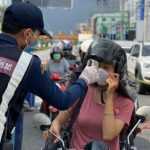As the ongoing coronavirus pandemic continues and the Foreign Office is advising against all non-essential travel “indefinitely” – when will it be safe to travel to Thailand?
Here’s everything you need to know about the current travel advice.
The FCO is advising “British nationals against all but essential international travel. Any country or area may restrict travel without notice. If you live in the UK and are currently travelling abroad, you are strongly advised to return now, where and while there are still commercial routes available. Many airlines are suspending flights and many airports are closing, preventing flights from leaving.”
Transport Secretary, Grant Shapps, has explained that at present, he would not be booking a summer holiday. Speaking to BBC Radio 4’s Today programme, Mr Shapps said that “clearly people will want to see what the trajectory of this disease is in the next few weeks”.
He added: “I won’t be booking a summer holiday at this point, let’s put it that way.”
 Thailand travel advice
Thailand travel advice
An Emergency Decree is also currently in force in Thailand. All foreign nationals are barred from entering or transiting Thailand except in certain limited circumstances. If you do not meet these criteria you should not try to enter or transit Thailand.
There are also increasing restrictions on travel within Thailand, which includes the possibility of airport closures and limits on travel between provinces. A nationwide curfew is in effect between 10pm and 4am each day, although with limited exceptions including travel to and from airports.
The Civil Aviation Authority of Thailand has extended the existing suspension of incoming international passenger flights until 5pm on 30 April.
Previous advice relating to travel to certain areas of Thailand due to safety concerns still stands.
The FCO “advise against all but essential travel to areas within the provinces on the Thailand-Malaysia border, including:
-Pattani-Yala-Narathiwat-Southern Songkhla province. This does not include areas north of and including the A43 road between -Hat Yai and Sakom, and areas north-west of and including the train line which runs between Hat Yai and Pedang Besar.”
What is the coronavirus?
The virus originated in Wuhan City, Hubei Province, but cases then spread to a multitude of countries around the globe, including Thailand.
“The symptoms are similar to other illnesses that are much more common, such as cold and flu.”
However, human coronaviruses can sometimes cause lower-respiratory tract illnesses, such as pneumonia, bronchitis or more severe diseases such as severe acute respiratory syndrome (SARS).
Coronavirus: The Facts
COVID-19 is a respiratory illness that can affect lungs and airways. It is caused by a virus called coronavirus and is spread primarily through droplets generated when an infected person coughs or sneezes, or through droplets of saliva or discharge from the nose.
What are the symptoms?
The NHS states that you should not leave the home if you have either:
– a high temperature – this means you feel hot to touch on your chest or back (you do not need to measure your temperature)•-a new, continuous cough – this means coughing a lot for more than an hour, or 3 or more coughing episodes in 24 hours (if you usually have a cough, it may be worse than usual)
What should I do if I feel unwell?
Don’t go to your GP but instead look online at the coronavirus service that can tell you if you need medical help and what to do next. Only call 111 if you cannot get help online.
What precautions can be taken?
Washing your hands with soap and water thoroughly. The NHS also advises to cover your mouth and nose with a tissue or your sleeve (not your hands) when you cough or sneeze; put used tissues in the bin immediately and try to avoid close contact with people who are unwell. Also avoiding touching eyes, nose and mouth unless your hands are clean.
When can I go outside?
The Government has put the UK into lockdown and instructed everyone to stay at home. You should only leave your home for very limited purposes:
-shopping for basic necessities, for example food and medicine, which must be as infrequent as possible-one form of exercise a day, for example a run, walk, or cycle – alone or with members of your household-any medical need, including to donate blood, avoid or escape risk of injury or harm, or to provide care or to help a vulnerable person-travelling for work purposes, but only where you cannot work from home
However, these reasons are exceptions – even when doing these activities, you should be minimising time spent outside of the home and ensuring you are 2 metres apart from anyone outside of your household.




